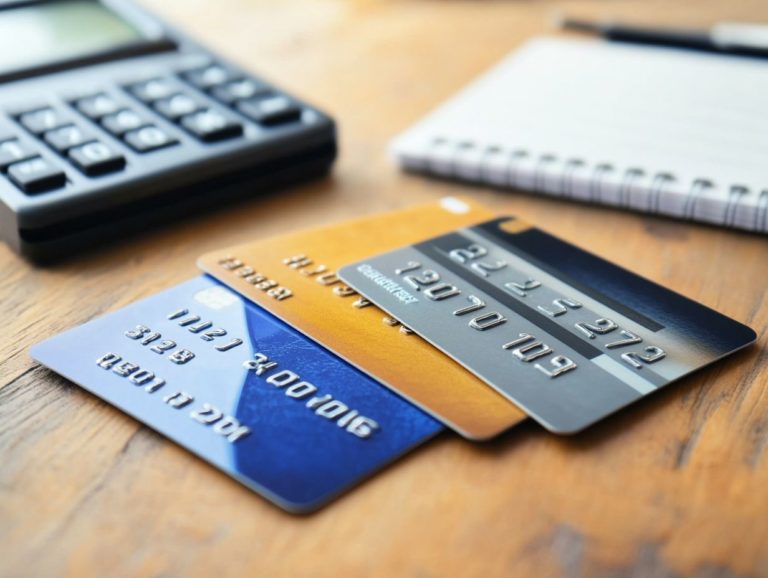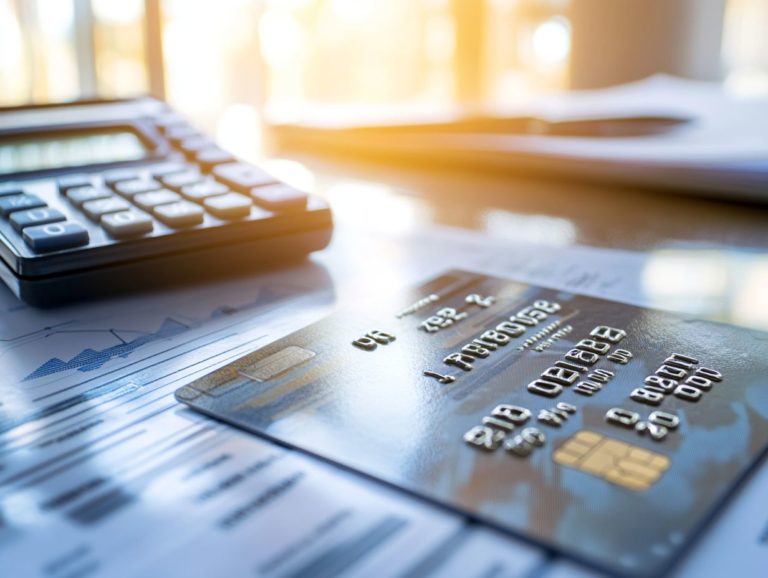Understanding the Application Process for Business Cards
Business cards are an essential asset for professionals aiming to leave a memorable mark. They not only provide critical contact information but also embody your brand’s identity in a tangible form.
This guide delves into the definition and purpose of business cards, emphasizing their significance and offering tips for designing an impactful card. It examines various printing options and the application process while drawing attention to common pitfalls to avoid.
Whether you’re an experienced entrepreneur or just starting your journey, this information will equip you with the tools to navigate the world of business cards effectively.
Contents
- Key Takeaways:
- What are Business Cards?
- Why are Business Cards Important?
- Designing an Effective Business Card
- Printing Options for Business Cards
- The Application Process for Business Cards
- Tips for a Successful Application
- Frequently Asked Questions
- What is the process for applying for a business card?
- What information do I need to provide when applying for a business card?
- Do I need to have an established business to apply for a business card?
- What documents do I need to provide when applying for a business card?
- How long does it take to get approved for a business card?
- Can I check the status of my business card application?
Key Takeaways:

- Business cards are a useful tool for networking and promoting your business.
- They serve as a powerful marketing tool, providing benefits like increased brand recognition and credibility.
- When applying for business cards, carefully consider design elements and printing options while avoiding common mistakes for a successful outcome.
What are Business Cards?
Business cards serve as vital financial instruments crafted specifically for small-business owners like you. They help manage your business expenses. Issued by esteemed institutions such as American Express or Bank of America, these credit lines come equipped with unique features tailored to your business needs.
Employee cards help you track spending and streamline the application process. They also help you separate personal and business expenses, which is essential for maintaining precise financial records and enhancing cash flow management.
Definition and Purpose
The definition and purpose of a business card center on providing you, as a small-business owner, with a dedicated financial tool to manage your business expenses while keeping them separate from your personal finances.
This specialized resource enables you to keep your business-related spending organized, which is vital for maintaining a healthy cash flow. By using your business card for purchases related to operations, supplies, and marketing, you can easily track your expenditures and gain insights into your financial health.
Many business cards offer features like expense categorization and spending limits, making bookkeeping simpler. Using these cards helps you build business credit and keeps your professional liabilities separate from your personal accounts, providing clearer financial boundaries and enhancing opportunities for future growth.
Why are Business Cards Important?
Business cards are essential for small-business owners. They are not only a tool for managing expenses but also an important part of establishing creditworthiness and enhancing cash flow management.
By applying for business credit cards, you can take advantage of cash-back rewards and travel rewards programs, which are particularly useful for handling travel-related costs and improving operational efficiency.
Benefits of Using Business Cards
The benefits of using business cards go far beyond convenience; they offer advantages like cash-back rewards and travel points that align with your spending habits as a small-business owner.
These financial perks not only enhance your finances but also play a vital role in managing cash flow for your enterprise. By leveraging rewards programs, you can turn everyday expenses into tangible benefits, ultimately boosting your bottom line. For instance, optimizing your expenses through the bonuses and incentives from business cards can help maintain a healthy cash flow.
These benefits help you stay disciplined with your spending. This discipline significantly contributes to the overall success and sustainability of your business, enabling you to reinvest in growth opportunities that will drive your venture forward.
Ready to create your impactful business card? Let’s get started!
Designing an Effective Business Card

Designing an effective business card requires a thoughtful combination of essential elements, such as the business name, logo, and contact information. This makes your card stand out and connect with your audience instantly!
A meticulously crafted card emerges as a potent marketing tool. It elevates brand recognition and nurtures valuable professional connections within the competitive business landscape.
Elements to Include and Tips for Design
When designing an effective business card, incorporate key elements like clear branding features: think business name, logo, and essential contact information. This ensures that your brand is immediately recognizable.
The overall layout is also vital. It shapes how your information is perceived and guides the viewer s eye seamlessly through the design.
A well-structured card strikes a balance between white space and text, preventing clutter and enhancing readability.
Choosing a color palette that aligns with your brand identity draws attention and evokes the emotions you wish to convey.
Utilizing contrasting colors for text and background can significantly elevate visibility, ensuring that the essential details pop.
Thoughtful typography choices can further embody your brand s personality, leaving a memorable impression that lingers with recipients long after they ve received your card.
Printing Options for Business Cards
In terms of printing options for your business cards, you have an array of choices, from digital printing to traditional offset methods. Each option comes with unique benefits and cost considerations.
The type of printing you select will impact the quality of your business card. It also serves as a reflection of your business image and professionalism.
Types of Printing and Cost Considerations
There are several printing methods available for business cards, including digital, offset, and letterpress. Each boasts its own unique qualities and price points.
Understanding the pros and cons of these methods is essential as a business owner. This knowledge allows you to make informed decisions that align perfectly with your branding needs.
For example, digital printing is often your best bet for small runs and quick turnarounds, proving to be more cost-effective. In contrast, offset printing delivers stunning high-quality results and vibrant colors, making it ideal for larger orders.
Then there’s letterpress printing, which introduces a tactile element that elevates the perception of luxury, albeit at a higher production cost.
By thoughtfully weighing the implications of each technique on pricing and design quality, you can tailor your marketing materials more effectively. Choose your printing method wisely to leave a lasting impression don’t wait to elevate your business identity!
The Application Process for Business Cards
The application process for obtaining a business credit card is a pivotal step for you as a small-business owner. It demands a comprehensive understanding of credit score requirements and the factors that credit card issuers scrutinize during their evaluations.
This often entails assessing personal guarantees as well as your business s creditworthiness.
You may need to provide essential documentation, such as a tax identification number and insights into your business structure, to facilitate the process effectively.
Steps to Apply for Business Cards

Applying for a business credit card involves several crucial steps. First, assess your eligibility based on your credit score and gather necessary documentation, such as your business’s tax ID.
Next, research different credit card options thoroughly. Compare rewards programs, interest rates, and any fees associated with each card.
After pinpointing suitable options, review the specific criteria set by each issuer. Gather all your documents neatly, including bank statements and business licenses. This level of attention can significantly boost your chances of approval.
Ultimately, crafting a comprehensive application will showcase your business in the best light, paving the way for a successful submission and favorable terms.
Tips for a Successful Application
To increase your chances of securing approval for a business credit card, it’s essential to avoid common pitfalls. These include neglecting to prepare your payment history and overlooking the value of consulting a financial professional.
By recognizing and avoiding these mistakes, you can create a compelling application that meets the expectations of credit card issuers.
Common Mistakes to Avoid
When applying for a business credit card, steer clear of common mistakes like neglecting to review your credit reports, failing to gather necessary documents, and not fully understanding the application terms.
These oversights can hinder your progress, reducing your chances of approval or resulting in less favorable terms. For instance, overlooking inaccuracies in your credit report can lead to higher interest rates or outright rejection. Similarly, arriving unprepared without the required documentation can cause frustrating delays, holding up your access to essential funding.
It’s also crucial to understand the intricacies of the application terms, as misunderstandings can lead to unexpected fees or obligations. Therefore, meticulous preparation and attention to detail can boost your chances of approval and set the stage for a healthier financial future.
Frequently Asked Questions
Here are some common questions about applying for a business card:
What is the process for applying for a business card?
The process for applying for a business card is relatively simple. Gather all necessary information and documents, fill out an application, and submit it to the credit card company for review. To better navigate this, consider understanding the credit card application process.
What information do I need to provide when applying for a business card?

When applying for a business card, you typically need to provide personal information like your name, address, and social security number, along with your business information, such as your company name and tax ID number.
Do I need to have an established business to apply for a business card?
No, you do not necessarily need an established business to apply for a business card. Some credit card companies offer options for individuals who are self-employed or have a side hustle. However, having a business can increase your chances of approval.
What documents do I need to provide when applying for a business card?
The specific documents required may vary by credit card company. Generally, you’ll need to provide proof of your business, like a business license or tax returns, as well as personal identification documents, such as a driver’s license or passport.
How long does it take to get approved for a business card?
The time it takes to get approved for a business card can vary by credit card company and your individual circumstances. Some may offer instant approval, while others may take a few days or weeks to review your application.
Start your application today and take the first step towards financial empowerment!
Can I check the status of my business card application?
Yes, you can check the status of your business card application by contacting the credit card company directly.
You can also check online or via their mobile app, if available. Don’t wait; knowing your application status can help you plan better!






